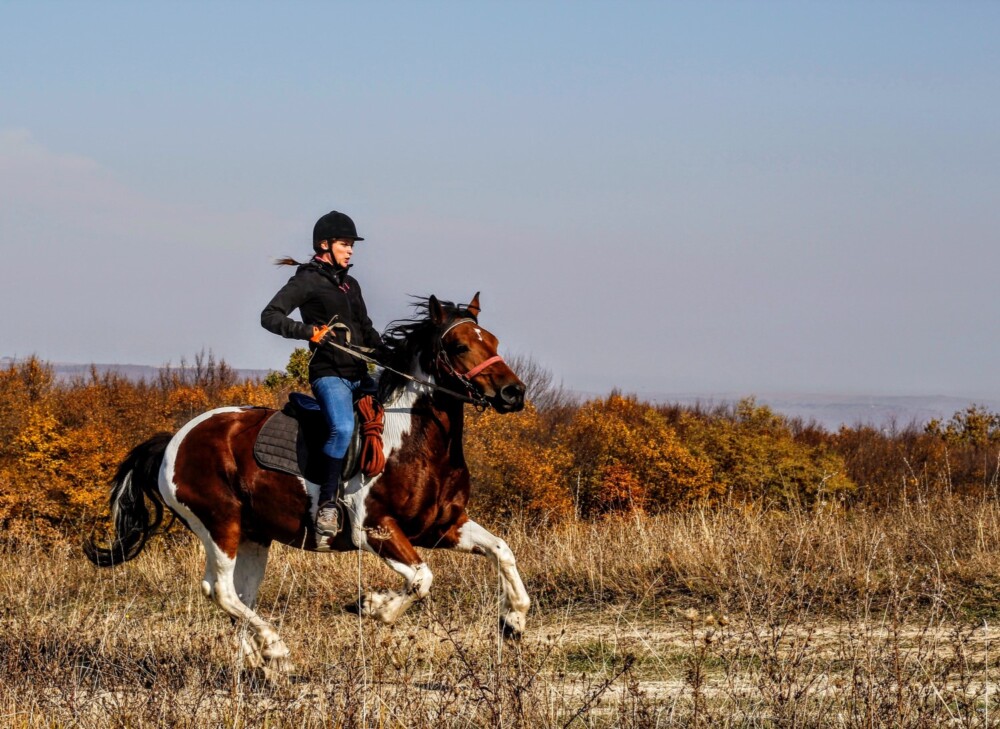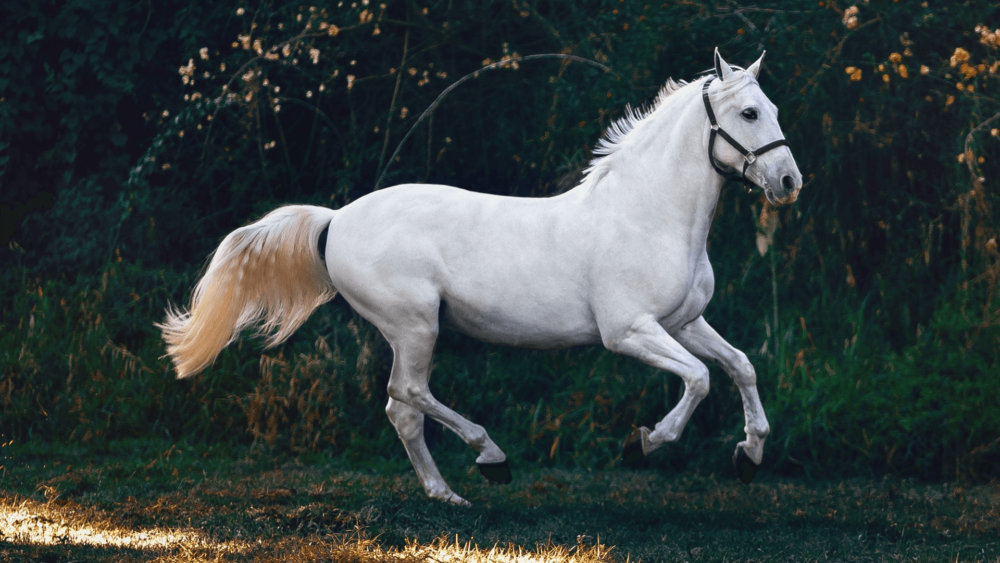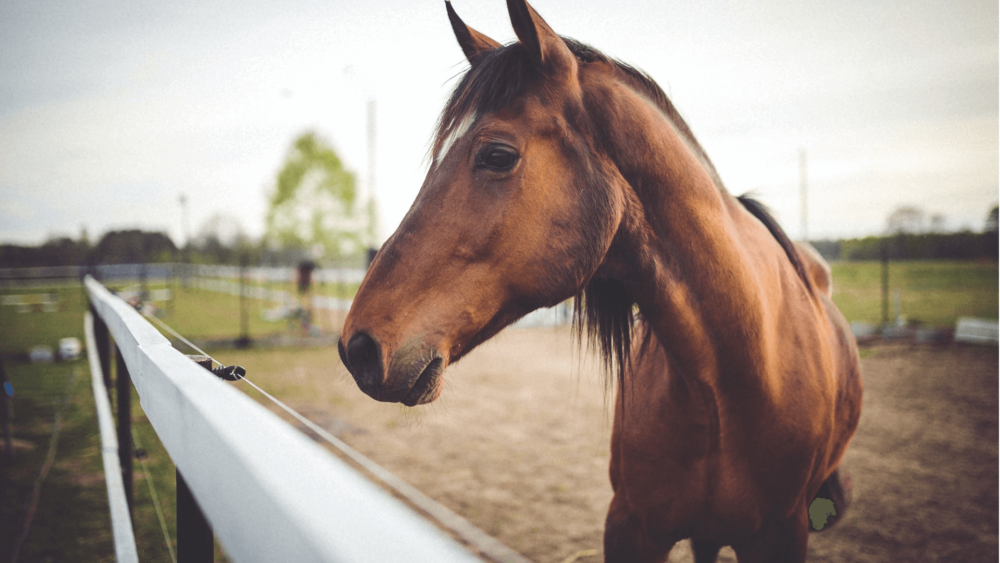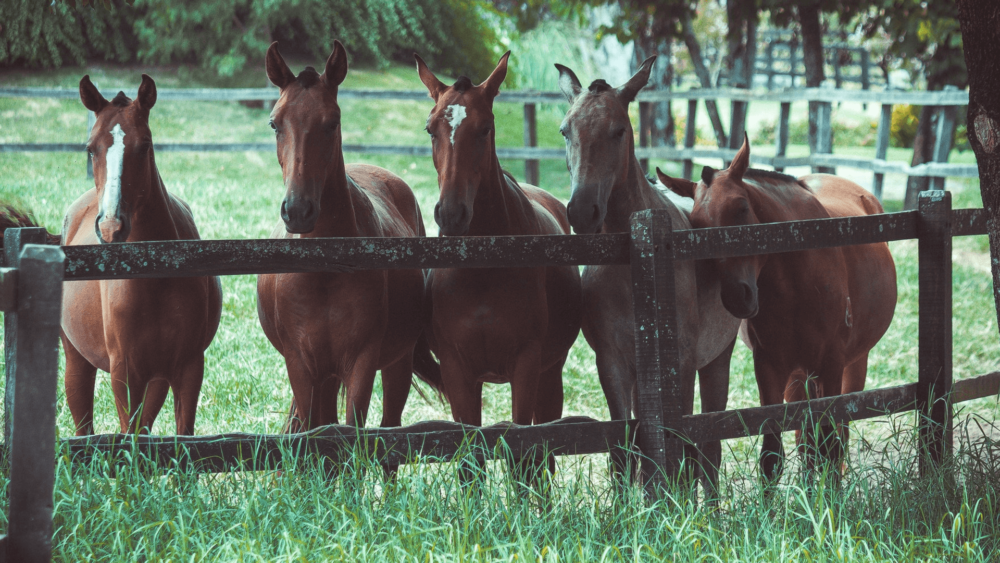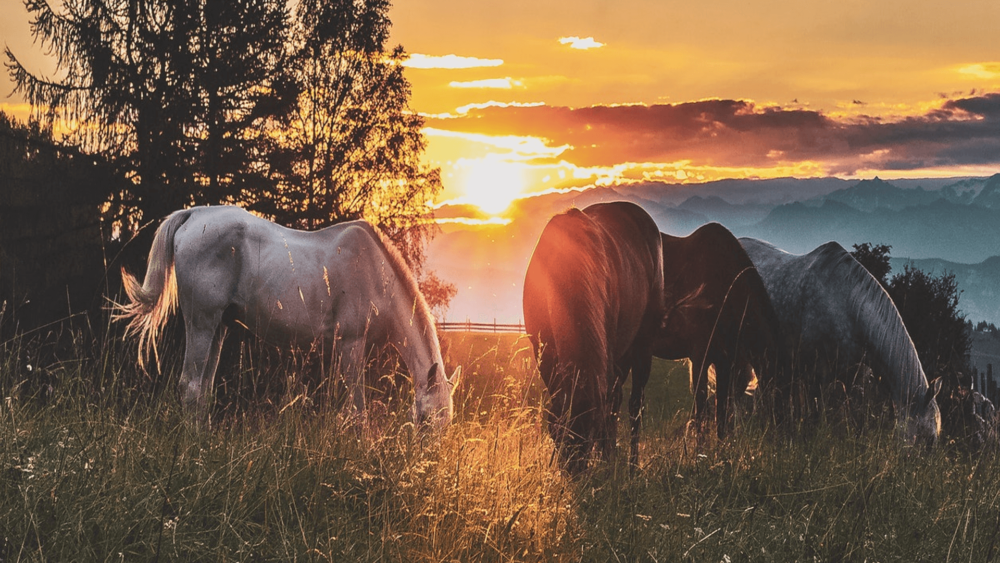It’s happened to most of us. You’re riding with a friend on the trail when they take the turnoff to go home. Your horse suddenly refuses to carry on along the path. Perhaps your horse wants to follow the other horse. Or they call out, back up, or even begin napping and want to bolt. Having a buddy sour horse is one of the most challenging situations for a rider to deal with.
A buddy sour horse is a horse that has strongly bonded with another horse to the point that it has a difficult time functioning normally without the other horse around. Buddy sour horses struggle to pay attention to your commands and are scary for an unprepared rider.
A buddy sour horse is afraid and lacks confidence. They haven’t accepted their rider’s guidance and don’t trust their rider to keep them safe. When a buddy sour incident happens, all you can do at that moment is damage control. Keep your horse calm, ensure they don’t back into something dangerous and prevent them from rearing or running off with you.
How do you stop your horse from being buddy sour? Help your buddy sour horse to focus on your commands instead of the friend. You can do this by working with your horse to break him of being buddy sour. Work your buddy sour horse harder when its by the friend and relax his workout when the friend moves away. Practice periods of separation, starting at 45 seconds and increasing it gradually through the workout.
This can be harder than it sounds. In this article, I’ll cover more in-depth how you can break a buddy sour horse. But, it will help to understand what causes buddy sourness first.
What Exactly Causes Buddy Sourness in Horses?
When a horse is buddy sour, its natural herd instinct has kicked in. Some horses are leaders, and others are followers. A buddy sour horse is a follower. They don’t want to get left behind because they still think a tiger will jump out of the grass to eat them.
Young horses can often display some of the characteristics of being buddy sour. They can act out because of being afraid, unbalanced, or poorly trained. Sometimes people believe a horse is naughty when showing buddy sour or barn sour behavior. Yet horses have no concept of “naughtiness,” and for them, all action is driven by a biological or psychological need.
Physical Causes of Being Buddy Sour
Horses that are experiencing pain or discomfort may fear being alone. When they are being ridden in poorly fitting tack, it can cause them to run toward a horse friend and not listen to their rider. They are learning not to trust their comfort to you.
When a horse has a buddy sour incident, it may become hypersensitive. Even the sensation of a few flies landing on their rump can send them bolting forward.
Mental Causes of Being Buddy Sour
A traumatized horse with bad memories of being ridden is more likely to become buddy or barn sour.
An insecure and easily frightened horse will often bond with another more confident horse. When the nervous horse is separated from its herd-bound mate, the nervous horse will become agitated and act out.
In worst cases, a horse that is buddy sour may actually attack anyone who comes to separate them from their herd buddy. Being buddy sour can turn to aggression, even when not being ridden.
Training Causes of Being Buddy Sour
Sadly, many of a horse’s mental issues can be due to inadequate training. As a horse rider and owner, it is always up to you to train your horse correctly and with kindness.
Trust between horse and owner is eroded in several ways. Poor training, excessive work, lack of feeding, overfeeding, incorrect discipline, and abusive riding are the main causes. These situations will always result in a horse that doesn’t trust its owner. Without a worthy human leader, the horse will have to trust another horse instead. After all, horses are natural followers, and they look to us for leadership.
Can you teach a horse not to be buddy sour in the future? You can absolutely train your horse to stop being buddy sour. Use training games, confidence-building exercises, desensitizing activities, and a careful ask-reward-and-release cycle. You can teach your horse to stop acting out when they are alone on the trail or when riding them in the arena alone.
With time, patience, and knowledge, it is possible to retrain a buddy sour horse or at least handle their outbursts better.
Signs of a Buddy Sour Horse
What is the difference between a horse that’s “naughty” and one that’s buddy sour? Sometimes there’s no difference, except the horse that’s buddy sour may be acting out of fear and not to spite its owner. You can start watching out for several signs to tell whether your horse is buddy sour.
1. Acts out When Other Horse Gets Attention
Horses don’t really know jealousy, but when they see the other horse gets love and attention, they may respond by being mean or clinging to the other horse. When the other horse gets removed from a shared pasture, the buddy sour horse may begin running up and down the fences. They may try to jump the gate to get to the other horse.
2. Becomes Unsafe When Ridden Alone
A buddy sour horse lacks confidence. Horses with poor confidence are easily scared, and they usually solve their fears by bucking, rearing, and bolting. If your horse refuses to walk through the yard gate to go for an outride with you, chances are good they are barn sour or buddy sour.
3. Difficult to Tie to Hitching Rail
Buddy sour horses don’t like confinement. If you happen to tie your horse, you may find out they will pull back and snap lead reins.
4. Excessive Neighing
A barn sour or buddy sour horse will neigh continuously and loudly while you lead them or ride them. Neighing can be accompanied by excessive circling and pawing of the soil.
5. Weight Loss
A stressed horse will struggle to gain weight or keep their weight. If your horse is starting to drop a lot of hair and shows bald patches, chances are there’s something wrong. Be sure to have them examined by a qualified doctor.
6. Sudden Aggression
A barn shy horse may suddenly lunge at you when you try to remove them from the pasture where they have other horse friends. Buddy sour horses will be disinterested in being ridden or working and may bite at you when you tighten the girth. They may also refuse to take the bit.
7. Refuses to Go Through Gates
Buddy sour or barn sour horses associate gates with going out to ride, so they will rear up or spin when you try to ride them through a gate. Sometimes, a buddy sour horse will be fine up to a point on the trail. Then they will suddenly become unmanageable and try to spin and run back to the yard or stables with you.
8. Self-Injury
When a buddy sour horse is acting out, they may lose the sense of self-preservation that horses usually have. In their attempt to get back to their friends or to get away from you, they may back into fences, run through fences, bang into doors, hit their heads, and even step on themselves. With the introduction of physical pain, the problem will escalate and they will become really dangerous to be around.
9. General Unhappiness
A buddy sour horse may be sweet and quiet when you ride them out with their friend. However, this is not always possible if you need to ride alone, attend shows, or do ranch work.
Being buddy sour is such a poorly understood equine issue that people usually end up selling a buddy sour horse or begin to act violently towards the horse. This all leads to a horse that is miserable and defiant. Their weight will drop, and their overall condition will become poor.
How to Overcome Buddy Sourness in Your Horse
So you’ve ended up owning a buddy sour horse. Now what?
Being buddy sour will always remain an issue, but you can decrease the severity and develop your horse into a willing and enthusiastic partner. The trick is simple: become their buddy.
Being your horse’s buddy is not about bribing them through gates with a carrot or only riding them with other horses. Instead, it’s about showing your horse you are a consistent and reliable partner. You can look after them, keep them safe, and won’t place them in any danger.
Here are some ways to win your horse over and make them into your best equine partner yet:
Create a Buddy Mindset
You will need to change the way you think about your horse. When a horse is buddy sour, we tend to feel upset and angry or scared and depressed. After all, you’re spending buckets of cash to care for them and your horse has let you down. It’s time to change your mindset.
Your horse is like a young child, and they are scared. Shouting at them or threatening or beating them will not work, so stop. Ask yourself what your horse needs from you.
Build Trust
A buddy sour horse lacks confidence, and they lack faith in you. Building trust with gentle groundwork and loads of praise is a great way to fix these issues. By simply working your horse in hand and showing them you can guide them, and they can do the right thing, you can retrain them. Your horse will learn to trust themselves and trust you.
Bomb Proofing for Confidence
Progress from groundwork to gently exposing them to obstacles and some minor “bomb proofing.” Make this into a game and reward often with release and treats. Never use a treat to bribe your horse to face an obstacle. Instead, guide them through obstacles and reward them with a treat and verbal praise.
Some great ideas for bomb proofing a sour buddy horse include:
- Walking them over tarps
- Sacking out a nervous horse by rubbing feed bags over their body
- Walking them past strange and new objects. Consider dogs, oversized teddy bears, bags, balloons, umbrellas, a hat on the ground, vehicles, a rope or garden hosepipe on the ground, and other unusual objects.
Use Rhythm as Distraction and Encouragement
Horses love rhythm. It is natural to them. By using rhythmic tapping or rubbing your horse rhythmically, you can help your horse calm down and relax.
When you are riding through a gate or feel your horse tense up, rub them rhythmically. You can also use a short riding crop to gently tap them on the shoulder in a soft and repetitive rhythm to calm them. Do NOT hit your horse.
Lunging and Long Lining
Working your buddy sour horse in the lunge can be really beneficial if you have access to a round pen or lunging ring. When a horse is working in the right outline with their head lowered and face on a vertical line to the ground, it makes them much easier to handle and control. This is a gentle process that takes time, and you can expect to spend months working on their outline in the lunge.
Be sure to keep lunging sessions short, starting with 10 minutes on each side and progressing to no more than 20 minutes to a side.
You can also work on liberty lunging where there are no restraints like lunge lines or bits on the horse. This helps your horse to listen to your voice, and it can even become a game or a dance between you and your horse. A horse that listens to you on the lunge (and at liberty) will be much happier going out on a trail with you.
Playing Leapfrog
When your horse has a buddy they stick to, you can train them to gently let go and not be as clingy. This work is best done while riding. Since buddy sour horses are poor leaders, this teaches them to pass the other horse in small increments and soothes them since their buddy will pass them next.
To play leapfrog, ride next to the buddy horse and their rider, then let the buddy horse move forward while you halt your horse for a few paces. The buddy then halts, and you ask your horse forward and past the buddy for a few paces before stopping and waiting.
Repeat this in the walk until your horse is calm and unbothered by waiting or passing. Step things up and start to perform this in the trot, where you use a slow trot for waiting and a faster trot to catch up and pass the other horse.
Finally, you can do this in a canter when you feel confident. This game becomes entertaining for horse and rider if there are a few riders as you go to the front of a cue or catch up right from the back.
Buddy Sour Horse Behavior and Appropriate Responses
Buddy sour horses will have many different behavioral triggers, and they can respond in many ways in each situation. Knowing what to do when your horse is acting out can keep you safe and help your horse stop their negative behavior.
Backing up and Refusing to Go Forward
This often happens as you approach a gate with your horse. Some good old fashioned riding sensitivity and patience will help you here. When your horse backs up, gently apply your legs to their sides, using gentle, rhythmic pressure alternating between the left and right leg. Don’t squeeze both legs simultaneously, as this can make your horse bolt forward or rear.
As soon as your horse takes a step forward, take the pressure off with your legs and praise your horse profusely. Give your horse a second to think about it and then ask them along with voice commands, then gentle alternating leg squeezes.
Repeat the ask-reward-wait process as many times as is necessary to help your horse get through a gate. Use gentle rein pressure to prevent your horse from spinning or suddenly turning to help them. If your horse is very flighty, be sure to use a wide gate to train with, as a narrow gate will be an even bigger issue and can be dangerous as there’s not much room to maneuver.
Rearing When Asked Forward
This can be particularly dangerous. It is nerve-wracking to sit a horse that rears when you simply ask for a step forward. Remaining calm and talking to your horse in a soothing tone can really help.
To handle a rear and stay safe, don’t jump off as you will simply be teaching your horse that rearing gets you off them. Instead, use your reins to turn your horse as soon as you feel them begin to rear. A horse that is bent to the side won’t be able to get the leverage to rear completely. As soon as they stop rearing, praise them and calm them down.
Carry on as if the rear never happened. Simply ask them forward again.
Be sure to keep your body upright and balanced. If you go into a fetal position, your horse will be able to pull you off their back, or you will fall off since your balance will be all wrong. Repeat this each time your horse threatens to rear.
As a safety mechanism, you can fit your horse with a running martingale that is set to the appropriate length, with the rings reaching your horse’s jaw line. It may seem strange, but a martingale can help stop your horse from throwing its head up to rear. Avoid a standing martingale or a tie-down as these are so restrictive they may cause the horse to panic and rear even more.
Bucking in the Canter or Running off With Upward Transitions
When a horse is asked to transition upward from a walk to a trot or canter, this can be a moment of truth. Buddy sour horses get so excited that they may decide to turn and bolt back to the yard with you. They may begin bucking if you resist their efforts to get back to their friends.
Don’t lose hope.
Sit the bucking, focus on staying on, turning your horse back, or transition down to a slower gait to help your horse become calm and settled again. Then ask your horse forward a few strides in the lower gait before again asking them for an upward transition. Repeat as many times as you need to. Remain calm.
Don’t let your fear dictate whether your horse is ready to transition upward or not. If you can’t control your fear, you won’t control your horse or trust them. Remember that trust is a two-way street. If you don’t trust your horse, they will feel it, and they won’t trust you.
Secret Weapon: The One-Rein Stop
Should your horse enjoy regularly running off with you, you must start teaching them the one-rein stop or the cavalry stop. Teach the one-rein stop in the walk and in a safe environment before progressing to the trot and finally to the canter. It involves releasing one rein (or softening your hand on that rein, so there’s no pressure) and then pulling the other rein in as tightly as you can so the horse has to bend their head and circle.
Keep that rein pulled in until the horse stops moving their feet, then pick up your regular contact and ride forward as if nothing happened. Do not scold your horse as this won’t achieve anything.
The goal is that the horse becomes conditioned that as soon as you pick up a firm contact on one rein, they will immediately stop since they know they won’t be able to run off. This maneuver takes courage. It’s easier to perform if you train your horse to it in a safe and contained environment such as the round pen or the school.
Tips for Handling Buddy Sour Horses
Working with a buddy sour horse can really keep you on your toes as you have to remain aware of what their body language is telling you while keeping your own body language as calm as possible. There is nothing worse than getting all excited and worked up when a buddy sour horse acts out. Even if you can’t control their behavior, you can manage your own, so be a confident and quiet leader your horse can trust.
Try these tips:
- Use a rope halter when fetching your buddy sour horse from the pasture where there are other horses.
- Take as much time as you need (or as your horse needs) in the training stages (from the lunge to liberty and bomb proofing to games like leapfrog). Never rush.
- Train your horse; don’t let them train you. If you find yourself only riding your horse when their buddy horse is being ridden with you, then your horse has taught you how to make them sourer.
- Remember that sourness can reassert itself whenever your horse gets into a situation where they feel scared or insecure.
- Ask small, reward big, praise often. Never bribe your horse. Keep it honest.
Sour Horse FAQs
What is a barn sour horse?
When a horse refuses to go out, becomes unruly when their buddy horse leaves them on the trail, or they run back to the barn with you when ridden, they are known as a barn sour horse.
How do you cure a barn sour horse?
First address any issues that may result from mental and physical health. Build friendship and connection with your horse. Once your horse trusts you, begin riding and leading them further away from the barn. Ensure they remain calm and attentive to you.
How do you cure an arena sour horse?
Horses that are arena sour often don’t like being worked extensively in the arena. The mental and physical strain may be too much for them. Give them a break, then start with light groundwork in the arena, stopping the session as soon as they have done something right. Give them lots of breaks in between working in the arena.
These horses need to mentally relax and begin associating the arena with good things.
If your horse bolts once you leave the arena or is unmanageable on an outride, then you should apply the same principle. Work in small increments, taking short outrides, rewarding with a lot of time with just letting them graze while you wait for them to relax. Remove pressure and focus on bonding.
How do you make a horse less herd bound?
A horse is a herd animal by nature. Asking them to head away from their herd is like asking them to walk into the lion’s den. Be sure to first teach your horse they can trust you. Work on earning their confidence by showing them they don’t have to be afraid and that you can keep them safe.
Build their confidence too by using smaller rides away from their herd as a starting point. As they form a partnership with you, they will become more confident and willing to leave the herd to be with you.
Why do horses become herd bound?
All horses are herd bound. From the early days as a foal, a horse will stick to their mom, looking for safety and guidance. When a horse is older, they will stick with other horses for guidance and protection. Instinct tells the horse that they are prey, that a predator will hunt and eat them, and that they are in danger when they are alone.
When a domestic horse has been scared in the past, has been trained poorly, or never had the gradual exposure to the world they need, they will become fearful. The horse will then stick to their herd for safety and assurance.
Conclusion
It is possible to regain a buddy sour horse’s trust and confidence. You can train them and help them trust you, so you become their buddy through bonding activities such as bomb proofing and lunging.
Always work below your buddy sour horse’s panic threshold as horses that panic can’t be reasoned with. Calmly guide your buddy sour horse to listen to you, but be sure to keep yourself as safe as you can.
Finally, a buddy sour horse may require serious riding and horsemanship skills. Be honest with yourself. If you don’t have those skills yet, work on getting them. Train with other riders on a less challenging horse (but not a plod-along) and transfer those new skills to your challenge horse.
Remember that a ride with your horse should be enjoyable, and you shouldn’t fear for your life or be in real danger. Horses should respect you since you pay the bills.
My Favorite Equine Resources For Horses and Donkeys
This list contains affiliate products. Affiliate products do not cost more but helps to support BestFarmAnimals and our goal to provide farm animal owners with accurate and helpful information.
Squeaky Chicken Toy is hilarious to watch and the horses love it! It’s not super tough so keep it away from dogs.
Dewormer with Ivermectin: I use this for my horses and my goats. Duvet makes a great dewormer. I switch between the Ivermectin one and one like this one so the worms don’t get immune to it.
Manna Pro Apple Flavored Nuggets are a delicious smelling treat that my horses go crazy over.
Equinity Amino Acid Supplement for Horses makes a big difference for any horse that’s struggling with arthritis, hoof issues, or just generally. It’s great for older horses who can’t absorb all the nutrients in their food as well!
Manna Pro Weight Accelerator helps older horses gain weight and stay healthier! This was especially helpful when one of my older horses lost weight over the winter and helped her regain her weight over the summer!
Farnam Fly Control goes on the horse or donkey and will keep the flies off your sweet pet. It makes horses way more comfortable and will keep sores from getting infected as well.
Wound Kote protects sores and wounds. It acts as an antiseptic and helps wounds heal faster. It works on both my horses and goats.

